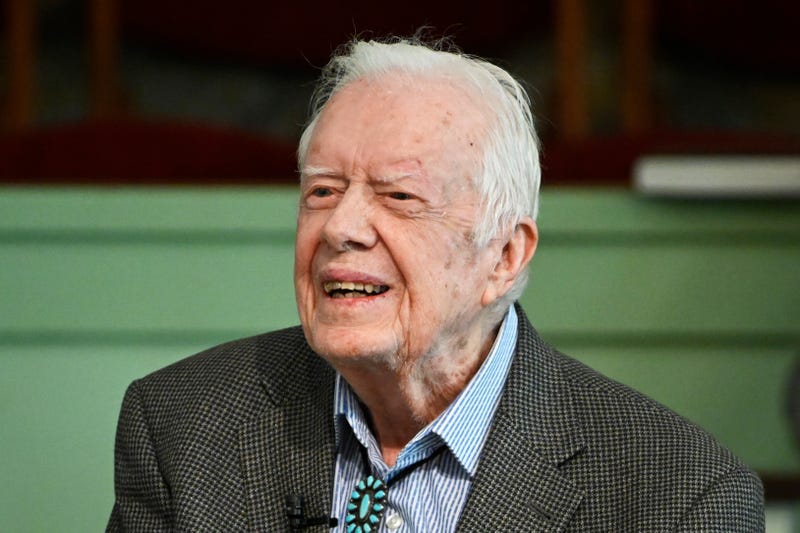
PHILADELPHIA (KYW Newsradio) — Jimmy Carter, the peanut farmer who won the presidency in the wake of the Watergate scandal and Vietnam War, endured humbling defeat after one tumultuous term and then redefined life after the White House as a global humanitarian, has died. He was 100 years old.
The longest-lived American president died on Sunday, more than a year after entering hospice care, at his home in the small town of Plains, Georgia, where he and his wife, Rosalynn, spent most of their lives, The Carter Center said.
Businessman, Navy officer, evangelist, politician, negotiator, author, woodworker, citizen of the world — Carter forged a path that still challenges political assumptions and stands out among the 45 men who reached the nation’s highest office. The 39th president leveraged his ambition with a keen intellect, deep religious faith and prodigious work ethic, conducting diplomatic missions into his 80s.
However, it is probably his humanitarian work, which followed his single term in the White House, that left his most enduring legacy, around the world and right here in Philadelphia.
After a series of short hospital stays, Carter, in February 2023, “decided to spend his remaining time at home with his family and receive hospice care instead of additional medical intervention,” according to a statement from his family.
Since then, he has celebrated his 100th birthday and mourned the loss of his beloved wife and former first lady, Rosalynn, whom he was married to for 77 years.
Rosalynn suffered from dementia. In November 2023, she joined Jimmy in receiving hospice care at their home in south Georgia. She died a few days later, on Nov. 19, at the age of 96.
“Rosalynn was my equal partner in everything I ever accomplished,” the former president said in the statement. “She gave me wise guidance and encouragement when I needed it. As long as Rosalynn was in the world, I always knew somebody loved and supported me.”
Carter traveled extensively into his 80s and early 90s, including annual trips to build homes with Habitat for Humanity and frequent trips abroad as part of the Carter Center's election monitoring and its effort to eradicate the Guinea worm parasite in developing countries.
But the former president's health had declined over his 10th decade of life, especially as the coronavirus pandemic limited his public appearances, including at his beloved Maranatha Baptist Church where he taught Sunday School lessons for decades before standing-room-only crowds of visitors.
'He elevated the 'humanity' in our name'
Carter’s work with housing nonprofit Habitat for Humanity made an indelible mark on Philadelphia and around the world.
“The vernacular — we shorten it and say ‘Habitat’ and we drop the ‘for Humanity,’” said Habitat for Humanity Philadelphia CEO Corinne O’Connell. “But I think he and Mrs. Carter elevated the ‘Humanity’ in our name.”
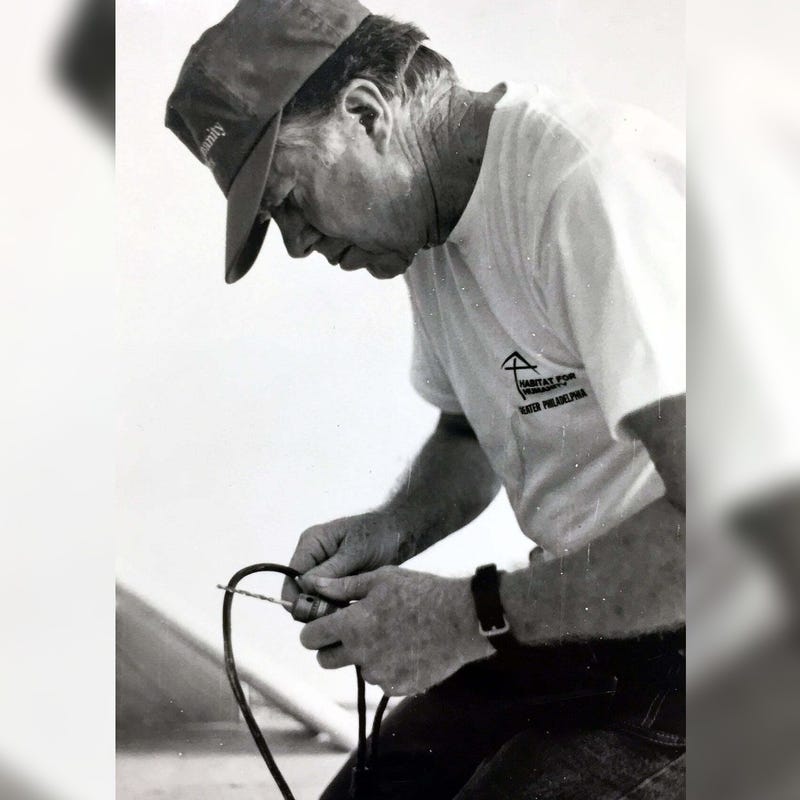
In June of 1988, the former president and his wife, Rosalynn, picked up a hammer and drill and, working alongside contractors, helped Habitat for Humanity build 10 houses in the 1900 block of Wilt Street in North Philadelphia.
The houses, right across the street from the nonprofit's Philadelphia office, are still occupied and serve as a lasting reminder of the week the Carters spent here, O'Connell said.
“To show up himself and — not for a photo op, but to actually work side by side with neighbors to build — I do think that there is such power in that."
Few people were living in the area at the time, O'Connell explained. Many vacant lots and homes were appraising for less than $5,000, until those days 35 years ago when the Carters came to help build new homes.
Those houses were among the first in Philadelphia built by Habitat for Humanity. As of last fall, O’Connell said, the organization has built and repaired 1,000 homes in the city.
She said through a partnership with Habitat, in the form of the Jimmy & Rosalynn Carter Work Project, 4,390 houses have been constructed in 14 countries.
From one term as president to decades as humanitarian
Carter was a little-known Georgia governor when he began his bid for the presidency ahead of the 1976 election. He went on to defeat then-President Gerald R. Ford, capitalizing as a Washington outsider in the wake of the Vietnam War and the Watergate scandal that drove Richard Nixon from office in 1974.
Carter served a single, tumultuous term. He governed amid Cold War pressures, turbulent oil markets and social upheaval over racism, women’s rights and America’s global role.
His landslide loss to Republican Ronald Reagan in 1980 ultimately paved the way for decades of global advocacy for democracy, public health and human rights via the Carter Center, which the former president and his wife, Rosalynn, 95, opened in 1982.
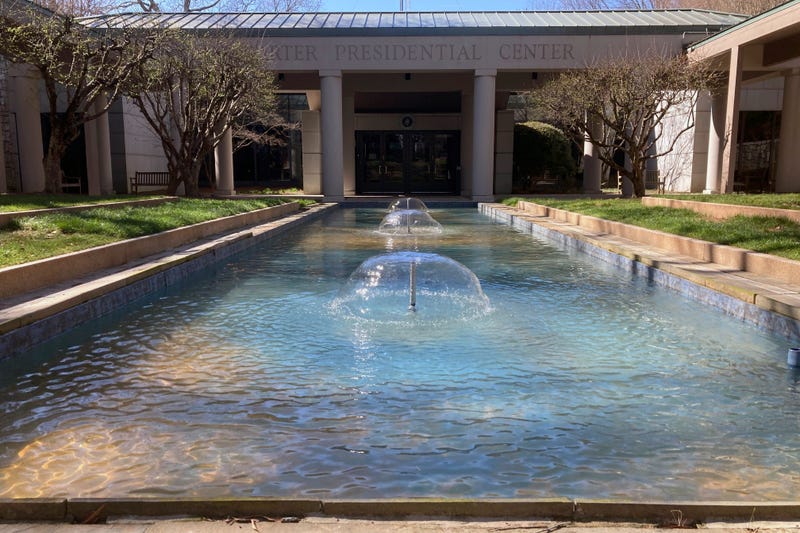
The Center has been a pioneer of election observation, monitoring at least 113 elections in Africa, Latin America, and Asia since 1989. In perhaps its most widely hailed public health effort, the organization recently announced that only 14 human cases of Guinea worm disease were reported in all of 2021, the result of years of public health campaigns to improve access to safe drinking water in Africa.
That's a staggering drop from when the Carter Center began leading the global eradication effort in 1986, when the parasitic disease infected 3.5 million people. Carter once said he hoped to live longer than the last Guinea worm parasite.
His work there garnered a Nobel Peace Prize in 2002.
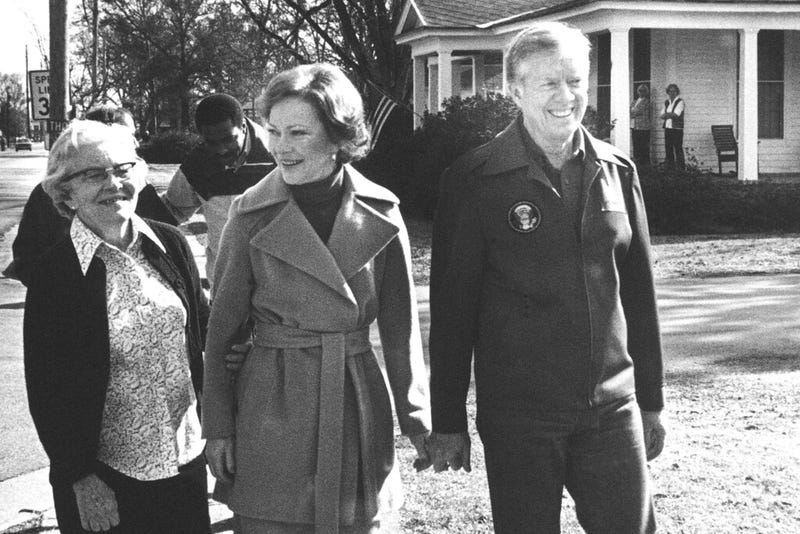
'If I ever lie to you, don’t vote for me'
Carter was born Oct. 1, 1924, to a prominent family in rural south Georgia. He went on to the U.S. Naval Academy during World War II and pursued a career as a Cold War Naval officer before returning to Plains, Georgia, with Rosalynn and their young family to take over the family peanut business after his father’s death in the 1950s.
A moderate Democrat, Carter rapidly climbed from the local school board to the state Senate and then the Georgia governor's office. He began his White House bid as an underdog with a broad smile, outspoken Baptist mores and policy plans reflecting his education as an engineer.
He connected with many Americans because of his promise not to deceive the American people after Nixon’s disgrace and U.S. defeat in southeast Asia.
“If I ever lie to you, if I ever make a misleading statement, don’t vote for me. I would not deserve to be your president,” Carter said often as he campaigned.
Carter, who came of age politically during the civil rights movement, was the last Democratic presidential nominee to sweep the Deep South, before the region shifted quickly to Reagan and the Republicans in subsequent elections.
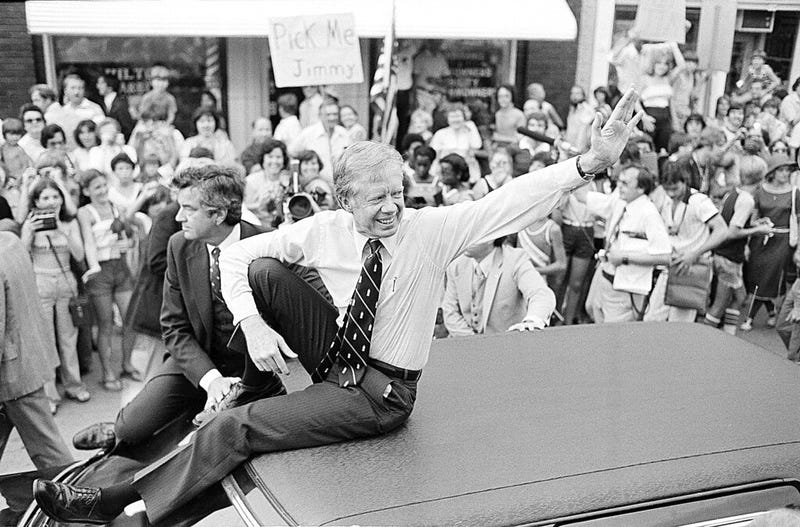
'Exciting, adventurous and gratifying'
In August 2015, Carter had a small cancerous mass removed from his liver. The following year, Carter announced that he needed no further treatment, as an experimental drug had eliminated any sign of cancer.
At the time, he expressed satisfaction with his long life.
“I’m perfectly at ease with whatever comes,” he said in 2015. “I’ve had an exciting, adventurous and gratifying existence.”
